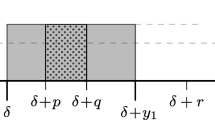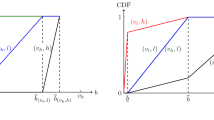Summary
In a (first price) all-pay auction, bidders simultaneously submit bids for an item. All players forfeit their bids, and the high bidder receives the item. This auction is widely used in economics to model rent seeking, R&D races, political contests, and job promotion tournaments. We fully characterize equilibrium for this class of games, and show that the set of equilibria is much larger than has been recognized in the literature. When there are more than two players, for instance, we show that even when the auction is symmetric there exists a continuum of asymmetric equilibria. Moreover, for economically important configurations of valuations, there is no revenue equivalence across the equilibria; asymmetric equilibria imply higher expected revenues than the symmetric equilibrium.
Similar content being viewed by others
References
Baye, M. R., de Vries, C. G.: Mixed strategy trade equilibria. Canadian Journal of Economics25, 281–293 (1992)
Baye, M. R., Kovenock, D., de Vries, C. G.: The all-pay auction with complete information. CentER Discussion Paper 9051, 1990
Baye, M. R., Kovenock, D., de Vries, C. G.: It takes two to tango: equilibria in a model of sales. Games and Economic Behavior4, 493–510 (1992)
Baye, M. R., Kovenock, D., de Vries, C. G.: Rigging the lobbying process: an application of the all-pay auction. American Economic Review83, 289–294 (1993)
Bikhchandani, S., Riley, J. G.: Equilibria in open common value auctions. Journal of Economic Theory 101–130 (1991)
Broecker, T.: Credit-worthiness tests and interbank competition. Econometrica58, 429–452 (1990)
Brooks, M. A., Heydra, B. J.: Rent-seeking and the privatization of the commons. European Journal of Political Economy6, 41–59 (1990)
Bull, C., Schotter, A., Weigelt, K.: Tournaments and price rates: an experimental study. Journal of Political Economy95, 1–33 (1987)
Dasgupta, P.: The theory of technological competition. In: J. E. Stiglitz and G. F. Mathewson (eds.) New developments in the analysis of market structure, pp. 519–547. Cambridge: MIT Press 1986
Deneckere, R., Kovenock, D., Lee, R. E.: A model of price leadership based on consumer loyalty. Journal of Industrial Economics40, 147–156 (1992)
Dennert, T.: Price competition between market makers. Review of Economic Studies60, 735–752 (1993)
Dixit, A.: Strategic behavior in contests. American Economic Review,77, 891–898 (1987)
Dougan, W. R.: The cost of rent seeking: is GNP negative? Journal of Political Economy99, 660–664 (1991)
Ellingsen, T.: Strategic buyers and the social cost of monopoly. American Economic Review81, 660–664 (1991)
Fundenberg, D., Tirole, J.: Understanding rent dissipation: on the use of game theory in industrial organization. American Economic Review77, 176–183 (1987)
Hendricks, K., Weiss, A., Wilson, C.: The war of attrition in continuous time with complete information. International Economic Review29, 663–680 (1988)
Hillman, A. L.: The political economy of protectionism. Harwood: New York 1988
Hillman, A. L., Riley, J. G.: Politically contestable rents and transfers. Economics and Politics1, 17–39 (1989)
Hillman, A. L., Samet, D.: Dissipation of contestable rents by small numbers of contenders. Public Choice54, 63–82 (1987)
Lazear, E. P., Rosen, S.: Rank-order tournaments as optimum labor contracts. Journal of Political Economy89, 341–364 (1981)
Magee, S. P., Brock, W.A., Young, L.: Black hole tariffs and endogenous policy theory, political economy in general equilibrium. Cambridge: Cambridge University Press 1989
Milgrom, P.: Rational expectations, information acquisition, and competitive bidding. Econometrica49, 921–944 (1981)
Moulin, H.: Game theory of the social sciences, 2nd ed. New York: New York University Press 1986a
Moulin H.: Eighty-nine exercises with solutions from game theory for the social sciences, 2nd edn. New York: New York University Press 1986b
Nalebuff, B. J., Stiglitz, J. E.: Prizes and incentives: towards a general theory of compensation and competition. Bell Journal of Economics13, 21–43 (1982)
Narasimhan, C.: Competitive promotional strategies. Journal of Business61, 427–449 (1988)
Raju, J. S., Scrinvasan, V., Lal, R.: The effects of brand loyalty on competitive price promotional strategies. Management Science36, 276–304 (1990)
Rogerson, W.: The social costs of monopoly and regulation: a game theoretical analysis. Bell Journal of Economics13, 391–401 (1982)
Rosen, S.: Prizes and incentives in elimination tournaments. American Economic Review76, 701–715 (1986)
Snyder, J. M.: Election goals and the allocation of campaign resources. Econometrica57, 637–660 (1989)
Tullock, G.: Efficient rent seeking. In: J. Buchanan et al. (eds.) Toward a theory of the rent seeking society. College Station: Texas A&M University Press 1980
Varian, H.: A model of sales. American Economic Review70, 651–659 (1980)
Weber, R. J.: Auctions and competitive bidding. In: H. P. Young (ed.) Fair allocation, pp. 143–170. American Mathematical Society 1985
Wenders, J. T.: On perfect rent dissipation. American Economic Review77, 456–459 (1987)
Author information
Authors and Affiliations
Additional information
We are grateful to Jacques Crémer, Chuangyin Dang, Jürgen Dennert, Chaim Fershtman, Martin Hellwig, Arthur Robson, Heinrich Ursprung, Eric van Damme, Ton Vorst, and the referees for helpful comments. We benefitted from presentations at the World Congress of the Econometric Society in Barcelona, the European Meeting on the Economics of Information at Tilburg University, the Midwest Mathematical Economics Meetings at the University of Illinois, and seminars at Texas A&M University, The Pennsylvania State University, Tilburg University and the University of Montreal. Baye is grateful for support from the CentER for Economic Research at Tilburg University and the Tinbergen Institute where earlier versions of this paper were completed. Kovenock acknowledges support from Erasmus Universiteit Rotterdam, the Tinbergen Institute, the Center for Economic Studies at the University of Munich, the Institut d'Analisi Economica CSIC at the Universitat Autonoma de Barcelona, the Krannert School of Management, and the Jay N. Ross Young Faculty Scholar Award.




